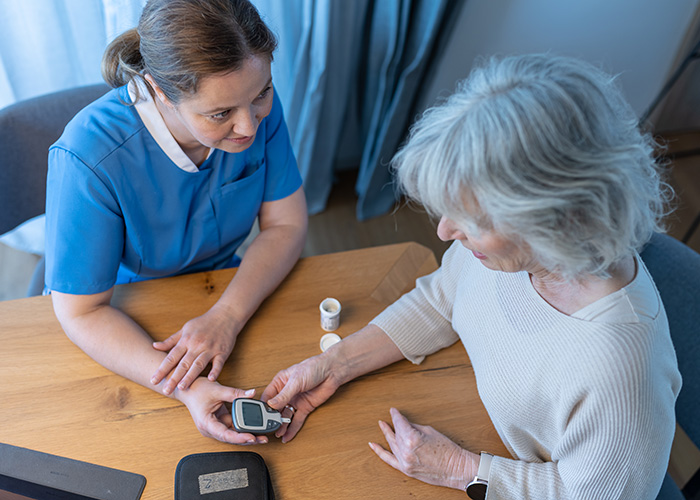Diabetes Awareness: Understanding the Impact on Senior Health

Diabetes is a chronic condition that can affect virtually every aspect of your health. Whether you have type 1 diabetes (T1D) or type 2 diabetes (T2D), learning how to effectively manage your blood sugar is essential to help minimize complications and improve your quality of life. Seniors with diabetes can continue doing the things they enjoy as long as they are vigilant about paying attention to their health.
Many people do not realize that the body’s inability to produce adequate amounts of insulin or use it effectively can impact a variety of organs and increase the risk of other health conditions. Here are just a few ways that diabetes can affect seniors.
Table of Contents
Kidney Function:
As you age, your kidneys may not work as effectively and efficiently as they once did. Diabetes further complicates this and can contribute to chronic kidney disease or CKD. High blood sugar causes damage to blood vessels and arteries in the kidneys interfering with their ability to properly filter your blood and remove waste products.
Cardiovascular Health:
Uncontrolled blood sugar can be a factor in developing atherosclerosis, which is a hardening and narrowing of the arteries that go to your heart. As a result, your heart must work harder to pump blood, and it’s easier for these passageways to become blocked, increasing your risk of heart attack or stroke.
Neuropathy:
Over time, diabetes can damage nerves throughout the body. You may experience tingling or numbness, especially in your hands and feet. This can affect your balance and coordination, putting you at greater risk for falling or dropping things.
Eye Health:
Another complication of diabetes can be vision loss. Conditions include diabetic retinopathy, diabetic macular edema, and neovascular glaucoma. High blood sugar can cause damage to your retinas and the blood vessels that connect to your eyes. You may experience blurry vision, dark spots, floaters, or have difficulty seeing in low light.
Infection:
Seniors may already have weakened immune systems due to other health conditions, but diabetes can put you at even greater risk of developing infections. Your body may have a harder time fighting off germs, bacteria, and viruses. It is a good idea to maintain proper hygiene and stay current with vaccinations.
Wound Healing:
In addition to being more susceptible to infection, your body may be slower to heal due to poor circulation from diabetes. If left untreated, ulcers, sores, and cuts can develop complications. It is important to conduct regular skin checks, especially on your feet.
Oral Health:
Diabetes can make you more prone to gum disease because of the body’s increased inflammatory response. You may also experience dry mouth which can contribute to gingivitis because of low levels of saliva production. Without enough moisture in your mouth, it’s harder to wash away bacteria, sugar, and food debris from your teeth and gums.
Mental Health:
Managing diabetes can be mentally exhausting. Having to constantly check your blood sugar levels, calculate insulin based on what you eat, and deal with unexplained highs and lows is a lot of work. It is not unusual for seniors to feel depressed, defeated, isolated, or stressed due to these demands. Having a strong support system can help.
Many seniors have been dealing with diabetes for years, but it can become more challenging as you get older and your needs change. Partnering with an in-home care provider can help you stay on top of appointments, medications, meal planning and preparation, and more, making it easier to manage your health. Contact Always Best Care at 403-768-4454 to learn more about the benefits of senior care and schedule a free consultation.





